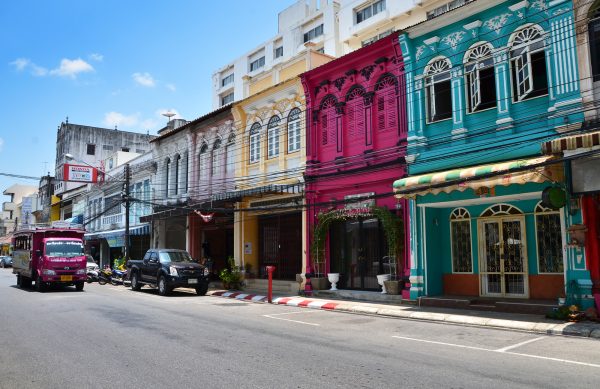
Thailand has seen a flurry of new political parties, some with old politicians at the helm, over the past two years. Among the most watched parties is the Sang Anakot Thai (Building Thailand’s Future), established by the ex-technocratic faction of the ruling Phalang Pracharat Party (PPRP), whose members had occupied key ministries in the Prayut government in 2019-2020. Earlier this month, the party formally introduced former deputy prime minister and famed economist Somkid Jatusripitak as its chairman and potential prime ministerial candidate for the upcoming general election.
Notably, Somkid’s grand debut stage following his appointment was not held in the capital Bangkok, but in the “pearl of the Andaman” southern island province of Phuket.
In a similar vein, the Kla Party founded in 2020 by ex-finance minister Korn Chatikavanij has prioritized Phuket’s development and has openly endorsed Phuketians’ long-standing demand for “autonomy” – something that many conservative elites in Bangkok see as a threat to national unity. Although Korn has recently made a puzzling decision to join forces with another party, seemingly throwing his own Kla Party under the bus, his Phuket policy will most likely stay unchanged.
Seasoned politician Sudarat Keyuraphan, who left her chief strategist role at the main opposition Pheu Thai Party (PTP) because of infighting and formed her own Thai Sang Thai Party in 2021, has likewise devoted more attention to Phuket. Sudarat’s move is striking, considering that she (or anyone linked to the PTP) has never been popular in southern constituencies.
These newly emerged parties have one thing in common: they have branded themselves as Thailand’s economic saviors. This is indeed a logical step. Against the backdrop of global economic downturn and after years of living with the security-oriented Prayut government, which has succeeded in upholding political stability but failed on the economic front, voters appear to be prioritizing the economy over other issues.
For economics-centric parties, the obsession with Phuket together with neighboring Phang Nga and Krabi provinces along the Andaman coast is hardly surprising. As Thailand’s tourism powerhouse, the “Andaman Triangle” with Phuket as the de facto head has long been regarded as a prime location for investment and has served as a testing ground for innovative schemes. The region was chosen as the pilot destination for the tourism “Sandbox” program during COVID-19 and is now undergoing a major transformation to become an “Andaman Wellness Corridor” (AWC) that aims to snatch 10 percent of the booming global wellness market share, worth around $7.5 billion, by 2027.
To further boost the AWC, the Thais have already launched a bid against four other countries – Argentina, Serbia, Spain, and the United States – to host the prestigious 2028 Specialized Expo in Phuket. If successful, Thailand will be the first Southeast Asian nation to host such an event. The AWC project also goes hand in hand with the ambition to turn Phuket into Thailand’s first full-fledged metaverse city.
Given that the new election could happen any time before late March of next year, however, it is doubtful whether new parties will be able to put up a good fight against richer and well-established major parties. Winning over one big party is already difficult enough, and there are at least three influential contenders in the Andaman Triangle. Adding to new parties’ misery, the 100 party-list slot election formula is tremendously favorable to large parties.
The Andaman Triangle (and the broader south) has traditionally been an impregnable Democrat stronghold. There is a saying that the Democrats could win even if they filed unresponsive electric poles as candidates, underscoring southerners’ undying loyalty to Thailand’s oldest political party. But this electoral landscape has changed since 2019, with the Democrat Party becoming increasingly challenged by the PPRP and the “weed party” Bhumjaithai – all three being part of the governing coalition. The 2019 general election saw the defeat of the Democrats in Phuket (to the PPRP) and Krabi’s Constituency 2 (to Bhumjaithai). And while the reformist Future Forward Party, now dissolved and reincarnated into the opposition Move Forward Party, did not prevail in the conservative-leaning Andaman, it managed to build a sizable youth support base in Phuket.
Competition in the Andaman Triangle will undoubtedly heat up in the coming months. Bhumjaithai appears to be taking the lead. By having its party leader Anutin Charnvirakul as the health minister, and its bigwig Pipat Ratchakitprakarn as the tourism minister, Bhumjaithai has been able to exert significant influence on local villagers as well as the Andaman business community.
But the old champion Democrat Party, filled with a sense of impending doom, is doing all it can to thwart Bhumjaithai’s aggressive expansion. On top of the humiliating 2019 election losses stemming from ambiguous policy stances, the party’s standing has been weakened dramatically by departures of many prominent members and leadership crisis. Any more failures would spell the end of the party.
With many old and new parties seeking to capitalize on the Andaman Triangle’s developmental potentials and battling to capture votes, the region could very well end up as Thailand’s most contested election battlegrounds.
All Eyes on the Andaman Triangle Ahead of Thailand’s Next Election
Source: Frappler

0 Comments